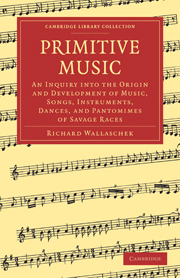 Primitive Music
Primitive Music Book contents
- Frontmatter
- PREFACE
- Contents
- CHAPTER I GENERAL CHARACTER OF THE MUSIC OF PRIMITIVE PEOPLE
- CHAPTER II SINGERS AND COMPOSERS IN PRIMITIVE TIMES
- CHAPTER III INSTRUMENTS
- CHAPTER IV THE BASIS OF OUR MUSICAL SYSTEM
- CHAPTER V PHYSICAL AND PSYCHICAL INFLUENCE OF MUSIC
- CHAPTER VI TEXT AND MUSIC
- CHAPTER VII DANCE AND MUSIC
- CHAPTER VIII PRIMITIVE DRAMA AND PANTOMIME
- CHAPTER IX ORIGIN OF MUSIC
- CHAPTER X HEREDITY AND DEVELOPMENT
- Summary
- List of quoted Authorities
- Index
- Plate section
CHAPTER I - GENERAL CHARACTER OF THE MUSIC OF PRIMITIVE PEOPLE
Published online by Cambridge University Press: 29 August 2010
- Frontmatter
- PREFACE
- Contents
- CHAPTER I GENERAL CHARACTER OF THE MUSIC OF PRIMITIVE PEOPLE
- CHAPTER II SINGERS AND COMPOSERS IN PRIMITIVE TIMES
- CHAPTER III INSTRUMENTS
- CHAPTER IV THE BASIS OF OUR MUSICAL SYSTEM
- CHAPTER V PHYSICAL AND PSYCHICAL INFLUENCE OF MUSIC
- CHAPTER VI TEXT AND MUSIC
- CHAPTER VII DANCE AND MUSIC
- CHAPTER VIII PRIMITIVE DRAMA AND PANTOMIME
- CHAPTER IX ORIGIN OF MUSIC
- CHAPTER X HEREDITY AND DEVELOPMENT
- Summary
- List of quoted Authorities
- Index
- Plate section
Summary
It is with music as with language: however far we might descend in the order of primitive people, we should probably find no race which did not exhibit at least some trace of musical aptitude, and sufficient understanding to turn it to account. In fact it would appear that among races of the very lowest order of civilisation there are frequently to be found some which have more musical capacity than many of a higher order. This is undoubtedly the case with the Bushmen.
The Bushman sings while he dances, swaying his body about in strict time with the music; nor does he cease until, tired out, he sinks to the ground and once more takes breath. Then he sings again, still keeping time to the music, and, raising himself quickly, begins to dance with renewed vigour. When dancing in his hut he leans upon two sticks, the lowness of the roof not admitting of his standing upright, while the hut itself is so small that it is only in the middle of a narrow circle that there is sufficient room for even a single dancer. Notwithstanding this apparently tiring amusement, the Bushman takes manifest delight in the dance, and the more weary he becomes the happier he is.
It may well be imagined what the atmosphere of the hut is, and what the effect of a Bushman dance. It is indeed similar to that of a Turkish bath, and travellers state that an European could scarcely exist in it.
- Type
- Chapter
- Information
- Primitive MusicAn Inquiry into the Origin and Development of Music, Songs, Instruments, Dances, and Pantomimes of Savage Races, pp. 1 - 65Publisher: Cambridge University PressPrint publication year: 2009First published in: 1893


